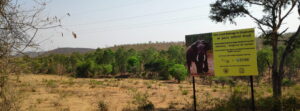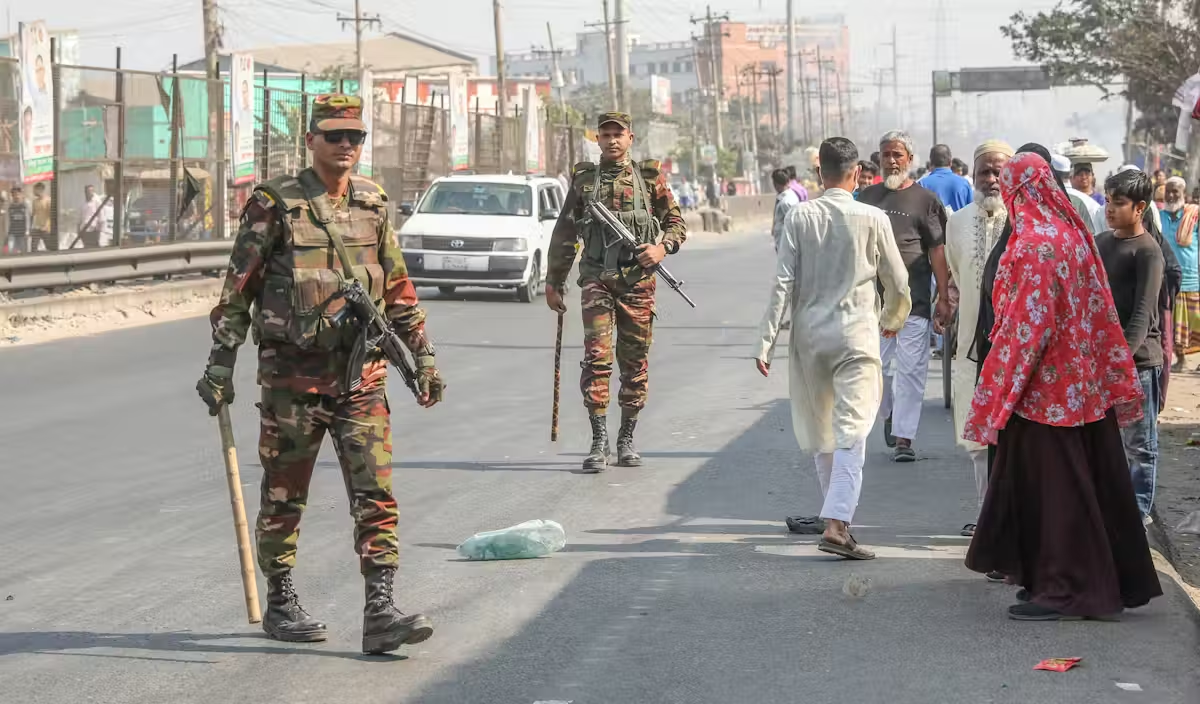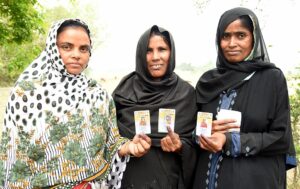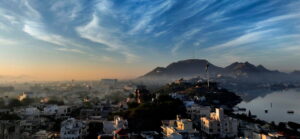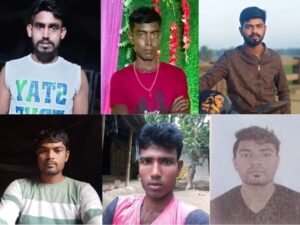Elevating Water Resilience: Story Of Odisha’s Penthakata Community
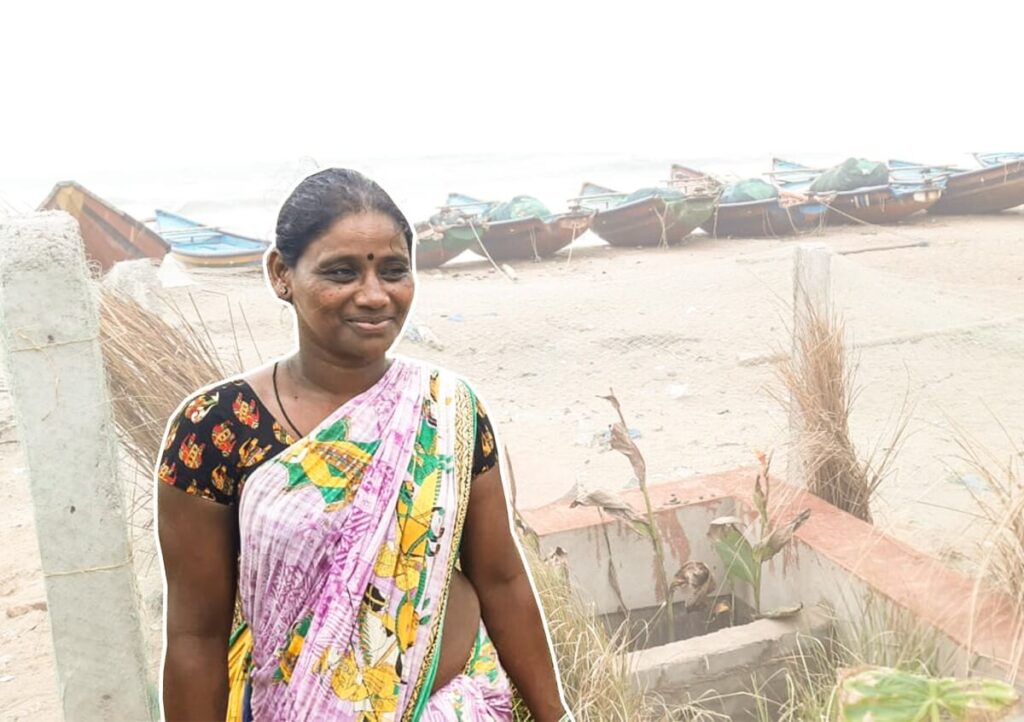
Chittama. Like other women from the community, Chittama makes several trips to get water from the municipal public water taps for domestic use. Due to insufficient supply points, she sometimes resorts to tapping groundwater from unregulated sources built by the community (Photo by Spandan)
Situated along the coast of the Bay of Bengal, in Puri, Odisha, the Penthakata settlement relies on the sea for its livelihood. While men set sail for fishing, the narrow streets spanning through shacks and semi-pucca houses buzz with activities of daily living. Small, poorly ventilated houses and the need to share public utilities push women and children outdoors, to get fresh air or for cooking, showering, washing clothes and playing.
Like other women from the community, Chittama makes several trips to get water from the municipal public water taps for domestic use. Due to insufficient supply points, she sometimes resorts to tapping groundwater from unregulated sources built by the community.
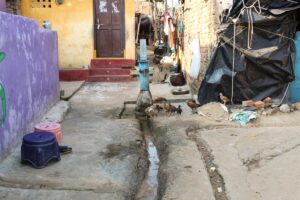
The wastewater from their daily activities flows through open drains that run into the sea. The streets, where Chittama’s children play, reek of stagnant wastewater from the drains, where mosquitoes breed. Outbreaks of diseases like diarrhea and dengue are common and untreated water causes severe groundwater pollution.
Falling under the coastal multi-hazards district, Puri frequently faces tropical cyclones, tsunamis, flooding and waterlogging. Penthakata, situated 200-300 meters from the coast, is highly vulnerable with risks to infrastructure and human lives. With limited preparedness and financial means to adapt, coping is a challenge for Penthakata.
Women Take the Lead
The migrant community from Andhra Pradesh that comprises Penthakata has grown to become one of the largest fishing urban slum settlements with a population of around 12,000. It is an ethnic enclave that relies on social capital to respond to extreme climate adversities. This is especially true for the women in the community who started a Self-Help Group (SHG) which created a resilience fund for support during disasters.
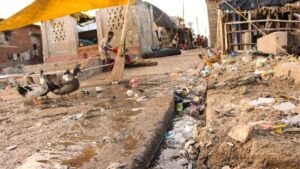
Their proactive leadership in addressing the problems of the community helped expand and fortify the efforts of Spandan, a local NGO working closely with the community on several water, sanitation and hygiene (WASH) related projects and has played a big role in setting up the fund.
Integrated Blue-Green Infrastructure (BGI)
To address the water risks and the steadily depleting coastline, Spandan implemented a pilot project that directed wastewater to a soak pit covered by bay-hops (beach weeds) to purify it and help recharge the aquifers. The coastal weeds were supposed to prevent sand erosion, but there were some challenges.
First, untreated wastewater would enter the environment. Second, the intervention was not demarcated clearly which led to fishermen dragging their boats over the soak pit and damaging it. Third, the lack of a public space kept people from the intervention. Lastly, the vegetation used (Psammophytes) thrived in dry sandy conditions and withered with continuous contact with water.
A winner of ‘The CityFix Lab: Accelerating Access Prize’, Spandan collaborated with WRI India, to assess ground reality at Penthakata along with extending their on-ground work.
We found that households like Chittama’s faced similar challenges and expressed their support for the project. They also shared ideas to add facilities like a fish drying area and seating, which offered opportunities for placemaking.
WRI India provided technical assistance based on these discussions to further improve Spandan’s pilot project. This resulted in the key interventions described below.
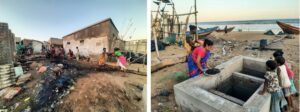
Treatment using a blue-green filtration system. This comprises three chambers filled with gravel, consisting of different water purification vegetation (alocasia, vetiver and canna lilies). Their roots help remove impurities from wastewater.
Additional treatment through soak pits. The water from the blue-green filtration system seeps through various layers of charcoal, gravel and sand within the soak pit, further removing contaminants from the water before it enters the environment.
Promoting climate resilience through coastal vegetation. Locally found bay-hops planted around the intervention prevent sand erosion and allow accumulation of sand.
Placemaking: Safe and vibrant public spaces were created to promote community bonding, socialization, and a sense of belonging and ownership. Low-cost and easily accessible tires and sandbags were used to make the seating, the fish drying platforms and the play area, which the community members helped paint and brighten up.
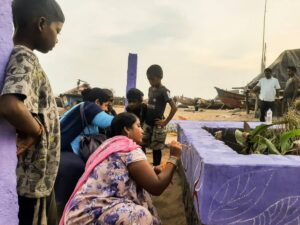
Apart from these interventions, approximately 300 meters of open drains were repaired and covered at certain sections. This helped reduce mosquitoes, wastewater overflow onto the streets and the spread of diseases. Wire meshes installed at regular intervals in the drain made it easier for the community to remove garbage along the drain stretches. Silt traps constructed in all 19 locations prevent solid waste from entering the BGI. These measures helped create more safe and healthy spaces within the community.
Spandan involved local women at every step of the process for capacity building and appointed 20 WASH ambassadors for long-term maintenance of the drains and the BGI. This directly benefited almost 5,000 families from 19 hamlets over just six months.
Setting Precedence for Vulnerable Communities
Technical flexibility, knowledge transfer and community buy-in were key to the success of this project. On-ground results from every stage of the project informed the joint design iterations done by WRI India and Spandan, including the choice of vegetation. The community’s involvement provided not only local knowledge and labor, but Spandan and WRI India were also able to build awareness and understanding of the BGI system. The setting up of women WASH ambassadors ensured steady operation and maintenance (O&M) of the intervention after completion.
With over 63% of slum households not having proper drainage connections in India, such easy-to-construct and multi-beneficial BGI systems can play a key role in mitigating WASH problems.
Placemaking can bring communities together to transform spaces based on their needs and aspirations for a better future. Be it Worli Koliwada fishing village in Mumbai or Urur Kuppam slum in Chennai, many communities face challenges like Penthakata. With their help, such low-cost, high-impact BGI projects can be easily scaled up, replicated and help women like Chittama be a part of a safe, resilient and healthy environment.
(Published under Creative Commons from WRI. Read the original article here)

